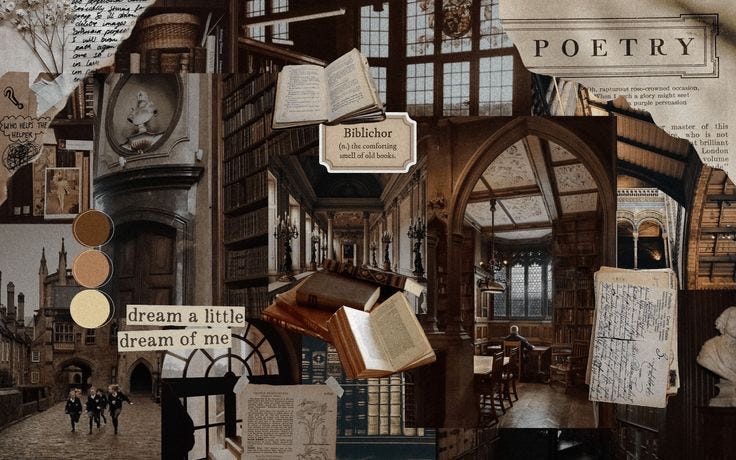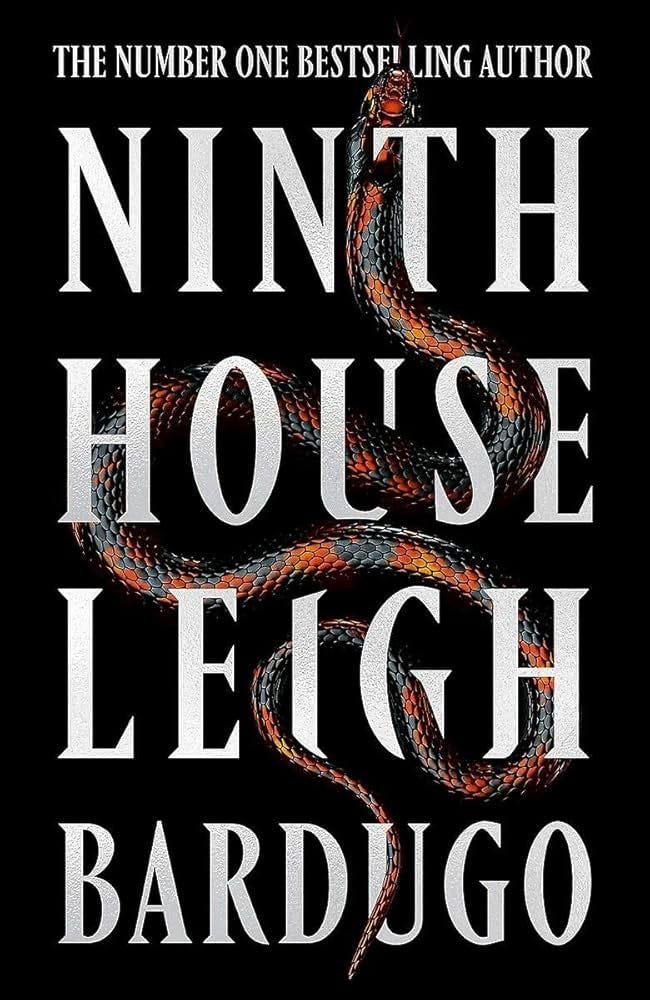Dark Academia, “Ninth House,” and the Aesthetic of Reading
A Review of Leigh Bardugo’s Novel and Cultural Analysis of Internet Aesthetics
If you’ve never heard of the “dark academia” internet aesthetic and sub-genre… honestly congratulations. You’re not chronically online and I’m frankly very impressed and slightly jealous.
Despite deleting Instagram and TikTok off of my phone, I do still follow trends but watch long form content on YouTube that doesn’t fry my brain like the attention-draining sub-60-second videos of TikTok. But long before I made the move towards regaining my attention span, I remember seeing content surrounding the “dark academia” aesthetic lurking around the corners of the internet.
Dark academia is a moody, gloomy aesthetic that glorifies the tragic academic who is constantly exhausted from staying up late in the pursuit of knowledge. Dark circles under your eyes are no longer considered a flaw needed to be corrected with copious amounts of makeup, skincare and supplements. No, it’s a sign of your commitment to the noble pursuit of knowledge. Ink smudges on your hands from taking too many notes? Perfect snapshot for Instagram.
But it’s not just aesthetic photos of Roman replicas of Ancient Greek marble statues, or pale, young students in awkward reading positions, it’s also a literary sub-genre. These types of books typically consist of an academic setting and have a dark twist that usually revolves around a morbid obsession with death.
Ninth House by Leigh Bardugo fits the bill pretty neatly.
Alex—short for Galaxy—Stern isn’t like most first years at Yale. She can see ghosts or “grays.” This rare gift grants her a full ride scholarship to the university curtesy of Lethe, one of nine secret societies at Yale which keeps the order amongst the other eight houses. Magic runs rampant within these houses and Lethe strides to regulate the chaos, making sure no one oversteps the bounds of the humane and ethical. But, like most who get a glimpse of true power, it is often abused.
Ninth House is a compelling read. I like how Leigh Bardugo jumps between the present moment, winter of Alex’s first year, and the beginning of her time at Yale and Lethe where she is under the supervision of Daniel Arlington, the “Virgil” to her “Dante,” a cheeky nod at Dante’s Inferno. However, with his mysterious disappearance, Alex is left to solve a mysterious murder on her own.
One of my many critiques with dark academia is the whiteness that tends to oversaturate the aesthetic. But Alex is mixed and many of the characters offer a needed diversity in the genre. For instance, The Secret History by Donna Tartt—often hailed as the book that started the dark academia sub-genre—is frequently critiqued for its almost glorification of whiteness and lack of diversity.
Alex, a former drug user who had hung with the wrong crowd, does not fit in with those at Yale or those who dabble in magic. Leigh Bardugo offers a fresh perspective and outlook on the Ivy League institutions. Her writing is fun and descriptive and had me captivated. I also had the utmost pleasure of listening to this in audiobook form and wholeheartedly recommend anything Lauren Fortgang narrates. She brings such life to the characters and dialogue!
For my review, I give Ninth House ⭐️⭐️⭐️⭐️ / 5.
It’s enjoyable, dark, gory and a perfect read for autumn—despite it being the start of summer—when that “dark academia” aesthetic is in full swing, with photos of the leaves changing at the Ivy Leagues begin circulating through your Instagram and TikTok feed.
While I like to purport that reading can increase empathy and understanding by learning about different cultures, these aesthetics and subcultures like dark academia turn reading into an aesthetic rather than a way to connect and engage with the world.
Like I discussed in the review of A Court of Thorns and Roses, the need to make content and farm engagement has turned reading into a commodity. If your aesthetically pleasing photo of your new book and a cup of coffee gains enough engagement, content creators can earn money from the posts or leverage the engagement to then do paid promotions. For some god forsaken reason, the general public seems to love watching videos of people posting their “book hauls” and thus the cycle of over consumption continues. Books are accumulated faster than they are read and this culture of over consumption becomes normalised for people who aren’t even content creators.
Hell, I even find myself wanting to get a cheeky book before work, that hit of dopamine just enough to get me through a shift. There’s nothing wrong with buying books when you still have books you haven’t finished on the shelf. While I only have about thirty unread books on my shelf, I’ve seen far too many content creators with their to-be-read list nearing four figures.
Reading becomes hollow when it’s an aesthetic rather than a pursuit of knowledge or empathy, even just for enjoyment. Social media is manufactured. Every perfect Instagram photo is curated to make an impression and so frequently that impression is a false lifestyle or misleading narrative, making you think that the creator is oh so studious, or actually loves the products with a shameless paid promotion tag on the bottom of the video.
I urge you to question the media you consume because it does affect you. Even if you mindlessly scroll past such flagrant posts shamelessly promoting products, even the glimpse of it, the repeated viewing even if it’s short, normalises the behaviour.
It’s not normal.
Read for fun.
Read for pleasure.
Read until the wee hours of night turns into dawn.
Read to learn about a different place or culture.
Read to learn something new.
Don’t buy books to prove something to the internet.
With love,
(Chaotically) Kate





I too consume media to learn and agree with your philosophy! I will also add the dark academia genre… not on my plate lol
I love your review and I loved your ending about why to read:) I have never ventured in to dark academia so it was really interesting to learn about this book!